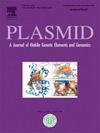质粒会影响巴氏不动杆菌 ADP1 中的微吲哚突变。
IF 1.8
4区 生物学
Q3 GENETICS & HEREDITY
引用次数: 0
摘要
质粒可以影响宿主的进化,例如通过携带诱变基因、与宿主基因的交叉对话或在转移过程中的SOS诱导。在这里,我们证明质粒可以影响宿主基因组中微吲哚突变的水平。这些突变是由单链 DNA 分子的产生驱动的,这些分子会侵入复制叉的微结构,并随后整合到基因组中。我们使用巴氏不动杆菌(Acinetobacter baylyi)作为模式生物,证明不同不相容群的广泛宿主范围质粒的携带可直接或间接导致微连接突变。属于不相容群 Q(IncQ)的质粒载体 pQLICE 通过特有的链置换机制进行复制,可直接通过源自 pQLICE 的短 DNA 片段产生染色体微印迹突变。此外,使用 IncP 质粒载体 pRK415(θ复制机制)的结果表明,质粒的存在可间接(即与染色体异位 DNA)增加微吲哚突变频率,这可能是通过质粒与染色体的相互作用导致 DNA 损伤。这些结果为微indel突变机制提供了新的机理认识,表明单链DNA修复中间体是致病因子。相比之下,IncN 质粒 RN3 似乎能抑制宿主微吲哚突变。其抑制机制尚不清楚。本研究中的其他质粒(属于 IncA/C2、IncW 和 pBBR 不相容组)的致突变效应不明确或无法量化。本文章由计算机程序翻译,如有差异,请以英文原文为准。
Plasmids affect microindel mutations in Acinetobacter baylyi ADP1
Plasmids can impact the evolution of their hosts, e.g. due to carriage of mutagenic genes, through cross-talk with host genes or as result of SOS induction during transfer. Here we demonstrate that plasmids can affect the level of microindel mutations in the host genome. These mutations are driven by the production of single-stranded DNA molecules that invade replication forks at microhomologies and subsequently get integrated into the genome. Using the gammaproteobacterial model organism Acinetobacter baylyi, we show that carriage of broad host range plasmids from different incompatibility groups can cause microindel mutations directly or indirectly. The plasmid vector pQLICE belonging to the incompatibility group Q (IncQ) and replicating by a characteristic strand displacement mechanism can generate chromosomal microindel mutations directly with short stretches of DNA originating from pQLICE. In addition, results with the IncP plasmid vector pRK415 (theta replication mechanism) show that the presence of plasmids can increase microindel mutation frequencies indirectly (i.e., with chromosomal ectopic DNA), presumably through plasmid-chromosome interactions that lead to DNA damages. These results provide new mechanistic insights into the microindel mutation mechanism, suggesting that single-stranded DNA repair intermediates are the causing agents. By contrast, the IncN plasmid RN3 appears to suppress host microindel mutations. The suppression mechanism remains unknown. Other plasmids in this study (belonging to IncA/C2, IncW, pBBR incompatibility groups) confer ambiguous or no quantifiable mutagenic effects.
求助全文
通过发布文献求助,成功后即可免费获取论文全文。
去求助
来源期刊

Plasmid
生物-遗传学
CiteScore
4.70
自引率
3.80%
发文量
21
审稿时长
53 days
期刊介绍:
Plasmid publishes original research on genetic elements in all kingdoms of life with emphasis on maintenance, transmission and evolution of extrachromosomal elements. Objects of interest include plasmids, bacteriophages, mobile genetic elements, organelle DNA, and genomic and pathogenicity islands.
 求助内容:
求助内容: 应助结果提醒方式:
应助结果提醒方式:


